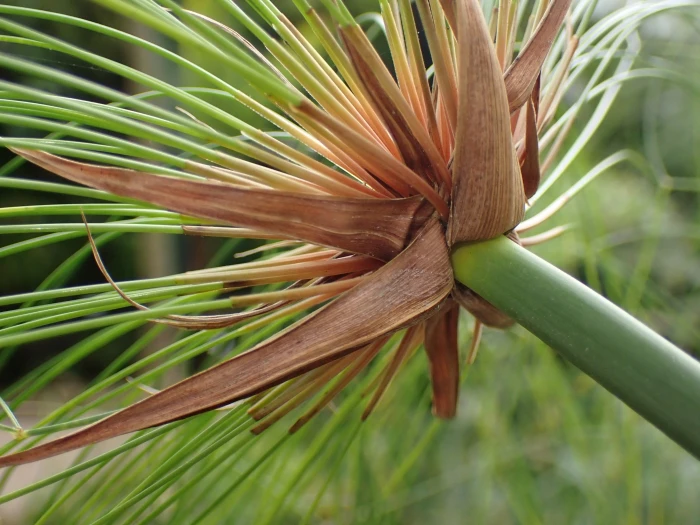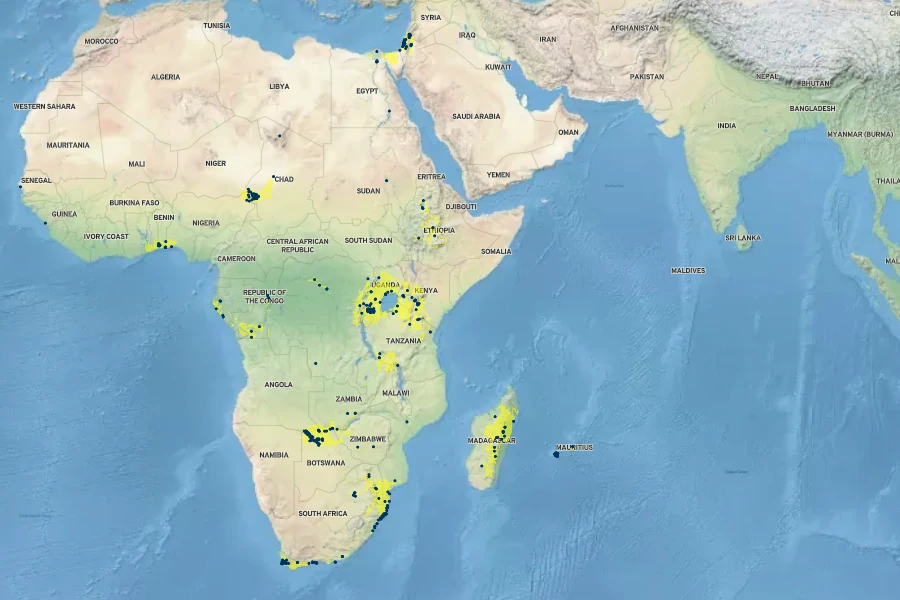Papyrus Sedge
/
(Cyperus papyrus)
Papyrus Sedge (Cyperus papyrus)
/

Krzysztof Ziarnek, Kenraiz
CC BY-SA 4.0
Image By:
Krzysztof Ziarnek, Kenraiz
Recorded By:
Copyright:
CC BY-SA 4.0
Copyright Notice:
Photo by: Krzysztof Ziarnek, Kenraiz | License Type: CC BY-SA 4.0 | License URL: https://creativecommons.org/licenses/by-sa/4.0 | Uploader: Kenraiz | Publisher: Wikimedia Commons | Title: Cyperus_papyrus_kz11.jpg | Notes: {{Information |Description ={{en|1=Location taken: the National Arboretum, Washington DC. Names: Cyperus papyrus L., Bulrushes, Cibora papirusowa, Cói giấy, Echter Papyrus, Egyptian Paper Plant, Egyptian Paper Reed, Egyptian Paper-Reed, Eg... |









































































Summary
Cyperus papyrus, commonly known as Papyrus Sedge, is a tender herbaceous perennial native to Africa, particularly thriving in the Nile Delta. It typically forms dense stands in wetlands and along riverbanks. This plant can reach 4 to 5 meters (13 to 16 feet) in height, with a striking appearance due to its tall, green, triangular stems topped with umbrella-like clusters of thread-like rays. The greenish-brown flower clusters mature into brown, nut-like fruits. Papyrus Sedge is historically significant as the source material for the ancient paper-making process.
Papyrus Sedge is valued for its architectural form and is often used in water gardens, ponds, and as a container plant for indoor or outdoor settings. It requires consistently wet soil or even standing water, making it ideal for riparian plantings. Full sun to part shade is preferred, with high humidity and warm temperatures to mimic its native tropical habitat. While it can be grown from seed, vegetative propagation by dividing the rhizomes is more common and reliable. This plant is known for its rapid growth and can be invasive outside its native range, so it is important to check local regulations before planting. It has been found to become invasive in Florida and has escaped in Louisiana, California, and Hawaii.CC BY-SA 4.0
Papyrus Sedge is valued for its architectural form and is often used in water gardens, ponds, and as a container plant for indoor or outdoor settings. It requires consistently wet soil or even standing water, making it ideal for riparian plantings. Full sun to part shade is preferred, with high humidity and warm temperatures to mimic its native tropical habitat. While it can be grown from seed, vegetative propagation by dividing the rhizomes is more common and reliable. This plant is known for its rapid growth and can be invasive outside its native range, so it is important to check local regulations before planting. It has been found to become invasive in Florida and has escaped in Louisiana, California, and Hawaii.CC BY-SA 4.0
Plant Description
- Plant Type: Grass
- Height: 5-8 feet
- Width: 2-4 feet
- Growth Rate: Rapid
- Flower Color: N/A
- Flowering Season: Summer, Fall
- Leaf Retention: Evergreen
Growth Requirements
- Sun: Full Sun, Part Shade
- Drainage: Standing, Slow
Common Uses
Bird Garden, Border Plant, Edible*Disclaimer: Easyscape's listed plant edibility is for informational use. Always verify the safety and proper identification of any plant before consumption., Potted Plant, Water Garden
Natural Habitat
Thrives in wetlands and along riverbanks in Africa
Other Names
Common Names: Paper Reed, Indian Matting Plant, Nile Grass
Scientific Names: Cyperus papyrus, Cyperus papyrus subsp. siculus, Chlorocyperus papyrus, Cyperus domesticus, Cyperus siculus
GBIF Accepted Name: Cyperus papyrus L.
